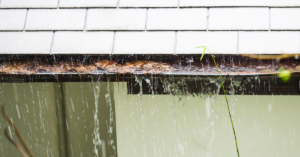Where you live and the surroundings of your house generally determine how many times a year you may need to get your gutters cleaned. However, most households need the gutters cleaned at least twice a year—at the beginning of winter and the beginning of summer.
This is because these seasons fall after the heavy shedding seasons, spring and autumn, when a lot of debris and leaves settle on the gutters.
However, cleaning your gutters in the winter is not the same as cleaning them in the summer. To know the difference, keep reading.
Challenges Of Cleaning Gutters In Winter Vs. Summer
Winter
Autumn brings a lot of leaves falling to the ground. They scatter around and get settled in the gutters, clogging them. The best trick is to let all the leaves fall in the autumn and clean all the debris from your gutter just before winter starts. If you don’t clean them at this time, the snow and ice (depending on where you live) will build up, which can even cause damage to the gutter.
Ice buildup in cold locations: Ice does not build up in clean gutters because the water can freely flow from them. Free-flowing water requires a greater drop in temperature for the water to freeze. When it is clean, the rainwater flows freely, and there is no freezing of water with the drop in temperature. However, a clogged gutter will have stored water that will freeze as the temperature decreases.
Ice dams in cold locations: If your downspouts are clogged, water will not get properly drained and will freeze. When this happens, the top of your gutters will have an ice dam, which is a frozen mixture of snow, ice, and debris.
Summer
A summer cleanup will clear off debris from spring and also prepare the gutter for autumn. In addition, there is a lot of leaf buildup in the spring, which can be a fire hazard, especially in bushfire-prone areas.
Summer storms: Summers have their fair share of rainstorms in Australia, and if your gutter is blocked, it will not allow free passage of water, which can damage your property.
Bird nests: Gutters offer a perfect environment for pests and birds to take refuge. Often during late spring and early summer, birds try to build their nests in gutters. A gutter clogged with leaves and twigs is much more appealing to birds than a clean one. Eliminating the debris greatly reduces the chances of nesting for birds as well as for stinging insects.
Fire hazard: The leaves and twigs in the gutters can easily catch a spark and lead to a big fire.
Hazards Of Not Getting Your Gutters Cleaned: Winter Vs. Summer
Winter
- As water expands on freezing, ice dams can push into the seams of the gutters, leading to sagging and even gutter collapse.
- If you do not get your gutter cleaned at the start of winter, you may have to do it in the middle of winter when your gutter is blocked by ice dams. The conditions are very slippery, icy, and slick and pose a fall hazard.
Summer
- If you don’t clear the leaves, a single spark from a bushfire will be enough to set your house on fire.
- If the gutters are not cleaned before summer, when the temperature is moderate, a need may arise to clean them during mid-summer, which can get very hot.
Conclusion
Keeping your gutters clean is crucial for the maintenance of your property. By getting your gutters cleaned before winter, you reduce the hazards associated with ice dams and ice buildup. Cleaning your gutters before summer will protect your house from fire.










